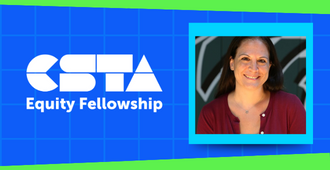Marisa Laks is a computer science teacher, programmer, and Girls Who Code club facilitator at the High School for Environmental Studies in New York City. She has been teaching for 19 years overall, and teaching computer science for four. In June 2022, she received a Computer Science Education Advanced Certificate from Hunter College. This past summer, Marisa was a trainer for the New York City Department of Education’s CS4All professional development program. She received an Equity Grant to create a data science unit on voter suppression, which she presented at CS4All’s 2022 Ready for Revolution conference. Marisa has participated in four Mathkind travel opportunities to Guatemala, where she worked with Guatemalan teachers and developed a coding unit that allows students to recreate the patterns of Guatemalan textiles. She is passionate about CS and believes that all students should have access to quality CS education.
Most of the students Marisa works with are Black and Latinx, and about 20% of them have learning disabilities. When they come into her classroom, students often feel nervous about their ability to learn code, or they believe that computer science isn’t “for them.” Marisa believes that her chief job as a CS teacher is to help her students develop a sense that they truly belong in computer science. Her classwork is designed to let students exercise their creativity and produce artifacts that reflect their individual interests and identities.
In one class project, students write programs in p5.js to create flags of their choosing, which may reflect any part of their identity or background. In another, they learn about different world holidays that include symbols relating to light, then choose which one they want to write code to create. Marisa also draws on her time in Guatemala to teach a lesson on Guatemalan textiles and how those textiles represent people’s identities. Students then write code to create a patterned blouse and share their programs with each other. “As they progress through the year,” she says, “they begin to see themselves as programmers.”
She also works to show her students that the field of computer science needs them. Her classes regularly incorporate discussions of how inequalities in society are replicated in technology, and what can be done to rectify those problems. “Students learn where bias exists in code,” says Marisa, “and why it’s important to have people of diverse backgrounds, like them, writing code.” She builds on this lesson by bringing in volunteers from the IT company Accenture to teach code in her afterschool club, lead virtual coding sessions, participate in Hour of Code events, and give presentations to full classes of students about their experiences of working in tech. These volunteers took many paths to their careers, enabling students to see, in Marisa’s words, “there isn’t just one way to a career in tech or just one type of person who works in the field.”
As this partnership with Accenture shows, Marisa is a strong believer in learning by example and working with peers and mentors to develop confidence in computer science. She starts each year’s classes with code-alongs and pair programming activities, allowing students to take turns writing code themselves and giving directions to their partner. Through a NYCDOE program, she has brought in mentors from major tech companies, including Spotify, Horizon, CVS Health, and Apple, who work with her students on app projects and share how students can use those same skills in the real world. Knowing how much CS4All professional developments have enhanced her own practice, Marisa recently offered a teacher training on how to teach p5.js to students. Afterward, she met with CS4All staff to discuss how she can expand the reach of this training to increase the number of participating teachers.
In her time as a CSTA Equity Fellow, Marisa hopes most of all to develop a strong network of support, learning, and mutual mentorship. “Although I have been teaching for many years,” she says, “I am still relatively new to computer science. Computer science teachers often work in isolation, and it’s important to be part of a network of teachers for strategies, ideas, and support.” She’s eager to find that network among her cohort, so that she can improve her own teaching and learn new ways to support other CS teachers.
Marisa hopes to develop a project to help students understand the growing importance of AI, and particularly to help them see how biased training data can lead to biases in the AI itself. She says, “I would like to work on a project that addresses these biases and helps students learn ways to overcome them.” In addition, she’d like to explore ways to implement computer science into other grades and subject areas in her school and district.
“It is vitally important that students feel a sense of belonging in their computer science class,” says Marisa. In her fellowship, as in all her work, she hopes to explore new ways to instill that sense of belonging in every student in tech.

